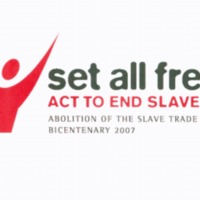
Set All Free: ACT TO END SLAVERY
Set All Free: ACT TO END SLAVERY was a project of Churches Together in England, based in London. It was also a collaboration between church-related groups, societies and organisations around the UK working together with a Christian ethos to assess the relevance of the bicentenary, and in particular the legacies of slavery. The project aimed to highlight how the values of the abolitionists can transform relationships on an individual, community and society level. The project included building a network coalition, campaigning, producing research and resources for churches, schools and individuals. Set All Free also worked closely with Anti-Slavery International and Rendezvous of Victory, a leading African community-led organisation.
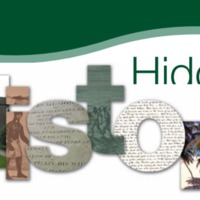
Hidden History of the Dales
This project was a collaboration between the Dales Countryside Museum in Hawes and North Yorkshire Record Office to research people and places of the Yorkshire Dales connected with Africa, the Caribbean and India. 'Hidden History' collected local stories of slave owners and traders, abolitionists, Africans and Asians who moved to the Dales, and others like the actor Ira Aldridge who passed through. The project included various community activities. Working with actor Joe Williams, pupils from the Wensleydale School explored the life of Olaudah Equiano and performed alongside Joe at the exhibition opening. There were drop-in sessions on exploring family history, carnival costume making, talks and music. The exhibition toured to other locations in Yorkshire, including Boroughbridge Library. The Dales Countryside Museum has continued to collect information relating to individuals who were connected with the Yorkshire Dales and the wider world.
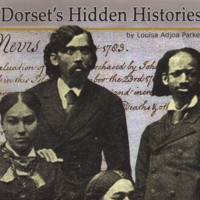
Dorset's Hidden Histories
DEED (Development Education in Dorset) works within the community to develop understanding of global education and cultural diversity. The charity produced and made available to hire the Dorset's Hidden Histories touring exhibition, which explored 400 years of the stories of people with African and Caribbean heritage across Dorset, Bournemouth and Poole. Many Dorset families were involved in slavery, either owning or trading in African slaves, and Black people were brought to Dorset by slave traders to live as servants in the large country houses. The exhibition, which is still available to borrow, also includes details of African American GIs on Poole Quay, a freed enslaved American living in Bournemouth, and Belle Davis, the African-American singer and dancer who performed in Weymouth in 1917. The organisation worked with Louisa Adjoa Parker, a local poet and black history researcher, to provide creative writing workshops to explore the exhibition. An accompanying booklet, written by Parker, can be purchased from DEED.
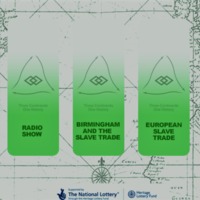
Three Continents, One History: Birmingham, the Trans-Atlantic Slave Trade and the Caribbean
'Three Continents, One History' was a community project led by the African-Caribbean Millennium Centre (ACMC) to explore the historical links between Birmingham, the transatlantic slave trade and the Caribbean. Research focused on themes such as the region's manufacturing history and its links to slavery, the role of local regiments in keeping order on Caribbean plantations, the African presence in the West Midlands, and the region’s role in the abolitionist movement. The project aimed to examine the contemporary relevance of 1807 and the slave trade to Birmingham’s diverse communities, to contribute to a reshaping of the National Curriculum, to establish a physical archive and an interactive website. The research was shared with the public via weekly broadcasts on New Style Radio (a community radio station housed in ACMC) and simulcasts with Caribbean and African radio stations. Other events included conferences, dramatisations and discussion workshops.
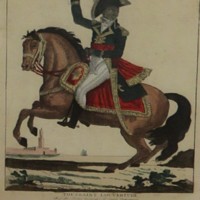
Freedom Think Tank
Freedom Think Tank was a time limited Black-led voluntary group established to influence the agendas of organisations in the North East commemorating the bicentenary of the abolition of the slave trade. The group also organised commemorative events, focusing on themes of promoting social solidarity and raising awareness of the participation of Black people in abolition.
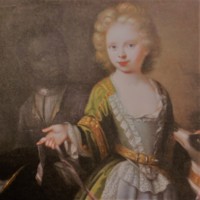
Revealed: Luxury Goods and the Slave Trade
Remembering Slavery 2007 was a regional initiative involving museums, galleries and other cultural organisations across the North East of England in a programme of exhibitions, events, performances, lectures and activities to explore the themes of slavery and abolition.
As part of the initiative, the Bowes Museum in Barnard Castle exhibited art objects from its collection, which traced the European demand for luxury goods linked to the system of plantation slavery, such as tobacco, sugar and indigo. For example, the exhibition included a number of sugar moulds and designs, alongside tobacco graters and tins. The recently conserved 'Girl with a Dog' by Philip Vilain (c. 1708) was also on display; the painting features a black servant faded into the background, revealing of eighteenth-century British society's racial divisions.
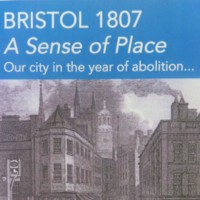
Bristol 1807: A Sense of Place
As part of the Abolition 200 programme, the Bristol 1807 project set out to explore the lives of ordinary Bristolians in 1807. An exhibition in the Central Library, and a series of touring exhibitions in Bristol's libraries and community centres explored society, culture, trade and travel in 19th century Bristol, a city and port with many ties to transatlantic slavery. The project collaborated with local schools to provide creative art workshops for children around themes of slavery and freedom. There were also 'Treasures in Store' hands-on sessions with rare library artefacts concerned with the period of abolition including books, newspapers and everyday objects. A book emerging from the project, 'Bristol in 1807: Impressions of the City at the Time of Abolition' by Anthony Beeson, was published in 2009.
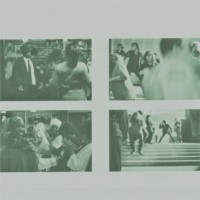
Down at the Bamboo Club: Film, Participation and Re-enactment
Down at the Bamboo Club was organised by Picture This, an artists' film and video commissioning agency in Bristol. The project was an exhibition of artists' video exploring Bristol's cultural histories and ideas of legacy. Contemporary artists worked with community groups to develop films and events that used the device of re-enactment to explore subjects such as community relations, identity, the legacy of slave trading in the city and histories of division and solidarity. One such film was 'Bamboo Memories' by Barby Asante. The Bamboo Club was a legendary Bristol nightclub in the 1960's and 1970's which holds great significance for older generations in the city as a place where first groups of African-Caribbeans socialised with white Bristolians.
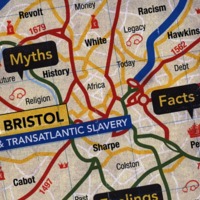
Myths, Facts, Feelings: Bristol and Transatlantic Slavery
The project to produce the booklet Myths, Facts and Feelings: Bristol and Transatlantic Slavery began in 2007. The Bristol Race Forum aimed to tackle some of the sensitivities, misunderstandings and popular opinions about the subject, and particularly in the Bristol area. The book's development went through a number of stages until it was published in 2012. The booklet and accompanying website for schools and communities across Bristol were produced with a view to sharing lessons from Bristol's past, and as a driver for future debate, activism and challenging prejudices. The contents were developed out of workshops with young people from the African Caribbean community and visits to community groups across Bristol.
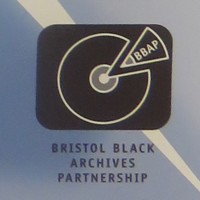
Bristol Black Archives Partnership
The Bristol Black Archives Partnership (BBAP) was set up to collect, protect and make available the heritage of Bristol's local black history. The partnership involved communities, heritage organisations and academic organisations coming together to collect and make accessible the archives - films, photographs, documents and objects - that reflected the experience and contribution of black people in Bristol. BBAP aimed to provide learning resources for a better understanding of Bristol's multicultural history: the 'Me, We, Making History' calendars celebrated local black achievers; 'My Legacy Journal' was made available for African-Caribbean people to record their own family identity, history and stories. A Black Bristolians Teaching Pack was produced, alongside a travelling exhibition based on the project's research entitled 'The Black Presence in Bristol - 16th Century to the Present Day'.
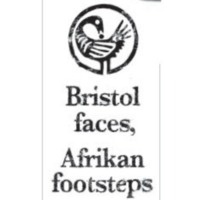
The Adisa Project: Bristol faces, Afrikan footsteps
The Adisa project gave a group of 20 young people of African and African Caribbean heritage the chance to investigate their roots both in Bristol and Africa. The group researched the history and legacies of Bristol's involvement in the trade in enslaved Africans, and its impact on one African country: Ghana. This was a community partnership project in collaboration with the Bread Youth Project, Full Circle Youth and Family and the Mill Youth Centre. The group opened their own exhibition, 'Afrikan Footsteps' at the City Museum and Art Gallery, after a two-week research trip to Ghana to learn about the country's history and culture. The exhibition included short films made by the participants; a Quotes Wall, taken from young people’s interviews with members of their local community; a wall of their personal heroes; a photographic exhibition of their trip; and 'Ma’afa Journey', a film recording their personal reactions to places visited in Ghana.
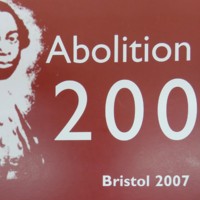
Abolition 200
Bristol was major trading port for the transatlantic slave trade in the 18th century. The city of Bristol marked the bicentenary of the Abolition Act with more than 100 events across the city - exhibitions, plays, debates, talks, concerts - under the umbrella organisation Abolition 200. In January 2007, city leaders signed a declaration of regret for the city's role in the trade. Over the weekend of 24-25 March, bells rang out across the city and a Service of Remembrance and Reconciliation was held at Bristol Cathedral, organised by a partnership of the Cathedral and the Council of Black Churches. 2007 was themed as the Year of Black Achievement, aiming to bring better provision of black heritage resources to schools in Bristol, with a particular focus on black attainment. Over 30 creative community projects were funded by Abolition 200 - including art installations, educational projects and community theatre - to reflect the themes of education, commemoration and legacy.
Featured here are some of the events from Abolition 200.
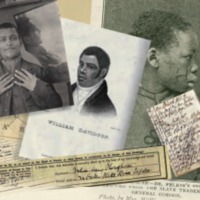
History Detectives: Black People in the West Midlands 1650-1918
SCAWDI are a Birmingham based community group specialising in working with local volunteers to research the early presence of Black people in the West Midlands and learn more about their local history. Different projects sought to explore this heritage. ‘In the beginning …’ looked at enslaved Africans who came to the West Midlands to live with wealthy land owners in the area’s stately homes. ‘History Detectives’ took this work further to identify and construct biographies for the black individuals who came to the West Midlands before 1918. The project created a database of almost 200 individuals: the characters explored connect to themes of slavery, class, migration and religion. ‘A day in the life …’ created a black heritage trail detailing the locations attached to these stories.
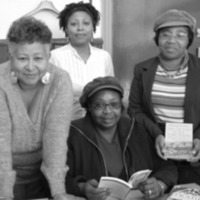
Interwoven Freedom
SCAWDI are a Birmingham-based community group specialising in working with local volunteers to research the early presence of Black people in the West Midlands. In collaboration with English Heritage, ‘Interwoven Freedom’ enabled a group of local women to visit archives, exhibitions and historic sites and explore the role of women in the abolitionist movement. The participants drew on traditions of abolitionist women such as Elizabeth Cadbury creating and distributing workbags filled with anti-slavery manifestos by making their own textile bags from fair trade cotton and African cloth. They wrote their own manifestos which mixed historical facts with fictional stories and poems. The accompanying exhibition of textiles, text panels and an audio documentary toured London and 11 regional venues. The exhibition included photographs documenting the project by photographer Vanley Burke.
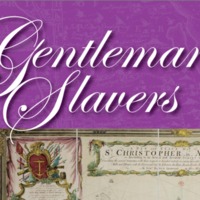
Gentlemen Slavers
Gentlemen Slavers was a project to explore the connections between the transatlantic slave trade and the London Borough of Sutton, particularly through the activities of one family – the Taylors of St Kitts. George Taylor, and later his brother John, lived on the Carshalton Park estate, funded by a family fortune made on slave-worked sugar plantations on the islands of St Kitts and Nevis. The project also looked in detail at the story of Samuel Mudian, a black man who worked at Carshalton Park as a butler for George Taylor, and likely a native of St Kitts. The project consisted of an exhibition, booklet, education pack and activity sheets.
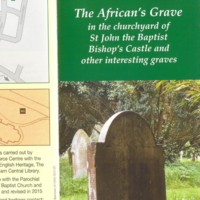
The African's Grave
In the churchyard of St John the Baptist Church, Bishop’s Castle, is an unnamed grave, dedicated to 'I.D., a Native of Africa', who died in 1801. Nothing is known for sure about the individual remembered by this gravestone, but the inscription is one used frequently by abolitionist sympathisers: 'God hath made of one blood all nations of men'. With connections to English Heritage’s ‘Sites of Memory’ project, in 2007 researchers attempted to find out more about the occupant of the grave. Partners in the project included Bishop's Castle Heritage Resource Centre, the parish Church of St John the Baptist and the Community College in Bishop's Castle. The research leaflet was revised and reprinted in 2015, as new evidence came to light about a local family, the Oakeleys, who had an interest in a plantation in Jamaica. Bishop's Castle Heritage Research Centre volunteers continue their research into the identity of ‘ID’ and the reasons they came to Bishop's Castle.
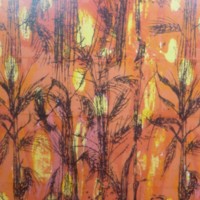
Trade and Empire: Remembering Slavery
The Whitworth Art Gallery was one of eight heritage bodies in the ‘Revealing Histories: Remembering Slavery’ partnership in Greater Manchester. The project set out to explore the history, impact and legacy of slavery on Britain through collections and community links in the North West.
'Trade and Empire: Remembering Slavery' explored the themes of trade and empire, commerce and collecting, and the impact of the experience of slavery and its legacy. Four invited artists and academics (SuAndi, Kevin Dalton-Johnson, Dr Emma Poulter and Dr Alan Rice) worked with Whitworth curators and learning staff to create the exhibition. It comprised of selections from the Whitworth's collections, contemporary works by Black artists, and objects on loan from Manchester Museum, John Rylands University Library Manchester, Bolton Museums and Archives Service and private collections. Areas of focus included a history of the Benin Bronzes, representations of Black people in British art, photographs of West Africa belonging to Tom Singleton Gardner, and printed textiles designed by Althea McNish. The exhibition was accompanied by a series of community engagement events.
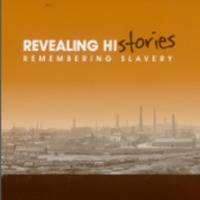
Revealing Histories: Remembering Slavery (Gallery Oldham)
Gallery Oldham was one of eight heritage bodies in the ‘Revealing Histories: Remembering Slavery’ partnership in Greater Manchester. The project set out to explore the history, impact and legacy of slavery on Britain through collections and community links in the North West.
A number of objects from Gallery Oldham's collections were identified as having links to the histories of the slave trade and slavery, focused on the themes of sugar, abolition, the American Civil War and the cotton industry. Two exhibitions also played a role in this trail. 'Cops and Bobbins', exploring Oldham's textile industry, illuminated the links with American slavery in the 19th century. 'Oldham Votes' looked at the significance of the election of 1832, during which slavery and abolition were debated. In collaboration with Touchstones Rochdale, Gallery Oldham also hosted a special day event, 'Slavery - what's it got to do with us?', featuring family activities, debate, and performances of African dance.
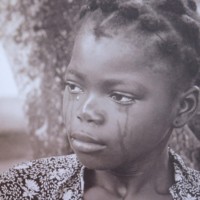
Remembering Slavery Exhibition
Remembering Slavery 2007 involved museums, galleries and other cultural organisations across the North East of England in a programme of exhibitions, events, performances, lectures and activities to explore the themes of slavery and abolition, and identify connections with the region.
The Remembering Slavery exhibition focused on objects, paintings, documents and other historical material relating to the transatlantic slave trade and its legacy. The exhibition and associated programme of activities opened at the Discovery Museum in Newcastle and then toured to South Shields Museum and Art Gallery; Sunderland Museum and Winter Gardens; and the Laing Art Gallery. Whilst at the Discovery Museum, the historical exhibition was accompanied by a photographic exhibition, ‘Human Traffic’, produced by Anti-Slavery International, documenting the trafficking of children in Benin and Gabon in West Africa. Whilst at the Laing Art Gallery, the exhibition was shown alongside ‘La Bouche du Roi’ by Romauld Hazoumé, a contemporary installation based on the ‘Brookes’ slave ship.
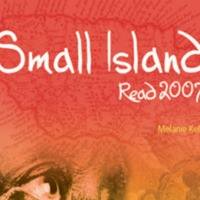
Small Island Read 2007
This community-based mass reading scheme drew together partners from four areas of the UK; Bristol and the South West (Great Reading Adventure), Liverpool and the North West (Liverpool Reads), Hull (Hull Libraries) and Glasgow (Aye Write! Bank of Scotland Book Festival). 50,000 free copies of Andrea Levy’s award-winning novel 'Small Island' were distributed - a story of Jamaican slave descendants arriving in the UK in the 1940s, it addressed resonant themes of identity, racial awareness, forgiveness, ignorance and survival. There was also an accompanying reader's guide. Younger audiences took part by reading Benjamin Zephaniah’s 'Refugee Boy', or Mary Hoffman’s 'Amazing Grace'. Activity packs inspired discussion of historic and contemporary issues addressed in the texts. Featured are some of the responses of pupils from Parson Street Primary School, Bristol, to 'Refugee Boy'.